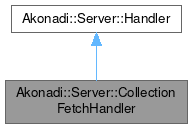Akonadi::Server::CollectionFetchHandler
#include <collectionfetchhandler.h>

Public Member Functions | |
| CollectionFetchHandler (AkonadiServer &akonadi) | |
| bool | parseStream () override |
 Public Member Functions inherited from Akonadi::Server::Handler Public Member Functions inherited from Akonadi::Server::Handler | |
| Handler (const Handler &)=delete | |
| Handler (Handler &&) noexcept=delete | |
| AkonadiServer & | akonadi () const |
| bool | checkScopeConstraints (const Scope &scope, const QList< Scope::SelectionScope > &permittedScopes) const |
| Protocol::CommandPtr | command () const |
| Connection * | connection () const |
| bool | failureResponse (const char *response) |
| bool | failureResponse (const QByteArray &response) |
| bool | failureResponse (const QString &response) |
| Handler & | operator= (const Handler &)=delete |
| Handler & | operator= (Handler &&) noexcept=delete |
| template<typename T> | |
| void | sendResponse () |
| template<typename T> | |
| void | sendResponse (T &&response) |
| void | setCommand (const Protocol::CommandPtr &cmd) |
| void | setConnection (Connection *connection) |
| void | setTag (quint64 tag) |
| DataStore * | storageBackend () const |
| template<typename T> | |
| bool | successResponse () |
| template<typename T> | |
| bool | successResponse (T &&response) |
| quint64 | tag () const |
Additional Inherited Members | |
 Static Public Member Functions inherited from Akonadi::Server::Handler Static Public Member Functions inherited from Akonadi::Server::Handler | |
| static std::unique_ptr< Handler > | findHandlerForCommandAlwaysAllowed (Protocol::Command::Type cmd, AkonadiServer &akonadi) |
| static std::unique_ptr< Handler > | findHandlerForCommandAuthenticated (Protocol::Command::Type cmd, AkonadiServer &akonadi) |
| static std::unique_ptr< Handler > | findHandlerForCommandNonAuthenticated (Protocol::Command::Type cmd, AkonadiServer &akonadi) |
 Protected Member Functions inherited from Akonadi::Server::Handler Protected Member Functions inherited from Akonadi::Server::Handler | |
| Handler (AkonadiServer &akonadi) | |
 Protected Attributes inherited from Akonadi::Server::Handler Protected Attributes inherited from Akonadi::Server::Handler | |
| Protocol::CommandPtr | m_command |
Detailed Description
Handler for the LIST command.
This command is used to get a (limited) listing of the available collections. It is different from the LIST command and is more similar to FETCH.
The RID command prefix indicates that collection-id is a remote identifier instead of a unique identifier. In this case a resource context has to be specified previously using the RESSELECT command.
depths chooses between recursive (INF), flat (1) and local (0, ie. just the base collection) listing, 0 indicates the root collection.
The filter-list is used to restrict the listing to collection of a specific resource or content type.
The option-list allows to specify the response content to some extend:
STATISTICS(boolean) allows to include the collection statistics (see Status)ANCESTORDEPTH(numeric) allows you to specify the number of ancestor nodes that should be included additionally to theparent-idincluded anyway. Possible values are0(the default),1for the direct parent node andINFfor all, terminating with the root collection.
The name is encoded as an quoted UTF-8 string. There is no order defined for the single responses.
The ancestors property is encoded as a list of UID/RID pairs.
Definition at line 49 of file collectionfetchhandler.h.
Constructor & Destructor Documentation
◆ CollectionFetchHandler()
| CollectionFetchHandler::CollectionFetchHandler | ( | AkonadiServer & | akonadi | ) |
Definition at line 37 of file collectionfetchhandler.cpp.
Member Function Documentation
◆ parseStream()
|
overridevirtual |
Parse and handle the IMAP message using the streaming parser.
The implementation MUST leave the trailing newline character(s) in the stream!
- Returns
- true if parsed successfully, false in case of parse failure
Implements Akonadi::Server::Handler.
Definition at line 459 of file collectionfetchhandler.cpp.
The documentation for this class was generated from the following files:
Documentation copyright © 1996-2025 The KDE developers.
Generated on Fri May 2 2025 11:53:10 by doxygen 1.13.2 written by Dimitri van Heesch, © 1997-2006
KDE's Doxygen guidelines are available online.